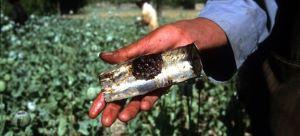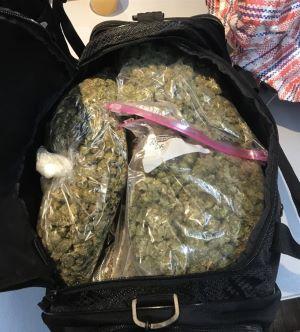Arkansas, Maryland, Missouri, North Dakota, and South Dakota all have marijuana legalization initiatives on the ballot next week.
A Pentagon cop gets nailed peddling cocaine, a Memphis cop goes to prison for ripping off and torturing alleged drug dealers, and more.
A Nevada judge orders marijuana removed from the state's Controlled Substances Act, the Germans roll out a marijuana legalization plan, British cops plan a crackdown on recreational drug users, and more.
There's a drug crackdown going on in India's Punjab, Afghan drug prices are rising despite questions about whether the Taliban ban is actually happening, and more.
A Colorado psychedelic initiative needs just a bit more support to get over the top next week, the Missouri marijuana legalization initiative is in the same boat, and more.
Colombia and the Czech Republic are both moving toward marijuana legalization, late polling doesn't bode well for the Arkansas marijuana legalization initiative, and more.
A late poll has good news for the Missouri marijuana legalization initiative, drug gangs rampage in Ecuador, and more.
A federal judge throws out a lawsuit seeking gun ownership rights for medical marijuana patients, competing Bolivian coca grower factions prepare to clash again this week, and more.
It is now less than a week until voters across the country head to the polls for Election Day 2022, and by the time the smoke clears, five more states could add themselves to the ranks of the legal marijuana states. Arkansas, Maryland, Missouri, North Dakota, and South Dakota have all qualified legalization initiatives for the next week's ballot.
If all five efforts were to succeed, the number of legal marijuana states would jump from 19 to 24, but with four of the five states being among the most conservative in the country, victories are likely to be hard-fought and narrow.
Organizers in a sixth state, Oklahoma, also gathered enough valid voter signatures to qualify for the ballot, but delays in signature counting by state contractors left t it unable to be certified by the official deadline for the November ballot. It will get a vote either in a special election or the next general statewide election.
Here is what we are looking at in each of the five states:
Arkansas
The Arkansas Adult Use Cannabis Amendment from Responsible Growth Arkansas would legalize the possession of up to an ounce of marijuana by people 21 and over and create a system of licensed marijuana cultivation, processing, distribution, and retail sales. It would also allow existing medical marijuana infrastructure (dispensaries, grow operations, etc.) to be integrated into the new adult use market. The Arkansas Beverage Control Board would be the regulatory agency.
Retail sales would face normal sales taxes plus an additional 10 percent tax. Fifteen percent of tax revenues would go to law enforcement, 10 percent to the University of Arkansas for Medical Sciences, five percent to fund drug courts, and the remainder to go into the general fund. There are no provisions for home cultivation or to promote social equity, although there is language deferring a criminal background check for people owning less than five percent of a marijuana business.
Recent polling from Talk Business and Politics-Hendrix College showed the initiative barely winning with 51 percent of the vote in a late October poll. The same outfit had the initiative at 59 percent in an early October poll, with the decline in support reflecting a rejection by Republican voters as Election Day draws nearer, partisan divides sharpen, and the state's Republican leadership attacks marijuana legalization.
Maryland
Question 4 would amend the state constitution by adding an article that allows people 21 and over to use and possess marijuana and providing that the General Assembly "shall provide for the use, distribution, possession, regulation and taxation of cannabis within the state."
This is an amendment that came not from the people but from the legislature, which passed it as House Bill 1 in April. The legislature that same month also passed implementing legislation to go into effect if the measure passes. The legislation, House Bill 837, which would set legal possession limits at 1.5 ounces and allow for the home cultivation of two plants. The bill would also automatically expunge convictions for conduct that would be legal if the measure passes.
The amendment contains no language about regulation or taxation. That will be left up to the legislature.
A March poll had support for legalization at a healthy 62 percent and a Baltimore Sun Media and University of Baltimore poll released Monday showed that support was remarkably stable over time, with 63 percent now approving the initiative, including 54 percent of Republicans.
Missouri
Sponsored by Legalize Missouri 2022, Amendment 3 would allow people 21 and over to possess up to three ounces of marijuana and grow up to six flowering plants, as well as six immature plants and six clones. The measure also provides for the automatic expungement of nonviolent marijuana-related offenses.
The initiative also "seeks to broaden industry participation by small business owners and among disadvantaged populations, including those with limited capital, residents of high-poverty communities, service-disabled veterans, and those previously convicted of nonviolent marijuana offenses," according to Legalize Missouri 2022.
The initiative would tax retail sales at 6 percent, with localities allowed to add a 3 percent sales tax. It also gives cities and counties the option of disallowing retail sales via a popular vote.
It would also allow existing medical marijuana operations to seek recreational sales licenses beginning December 8, with regulators allowed up to 60 days to approve them, giving them an effective head-start on newcomer competitors.
The measure had drawn organized opposition from within the cannabis community, with critics saying it does not do enough to promote social equity, that it favors existing operators, and that because it is a constitutional amendment, the legislature would have little say.
In the final days of the campaign, the initiative is being attacked from all sides and is generating polling that is all over the place. Of three polls in the last six weeks, two had the initiative failing with 43 percent and 48 percent of the vote, while a third had it winning with 62 percent. Somebody is right, but it will take an actual election to find out who.
North Dakota
Sponsored by New Approach North Dakota, Initiated Statutory Measure No. 1 would allow people 21 and over to possess up to an ounce of marijuana, four grams of concentrates and infused products, and grow up to three plants at home, but not to consume it in public.
The measure includes specific child custody protections for parents who use marijuana in accord with state law, but employers could continue to prohibit marijuana use and there is no provision for expungement. New Approach North Dakota says it intends to address that in the legislature next year. The measure would also allow cities and counties to opt out of allowing marijuana businesses.
The initiative also creates a regulatory framework for commercial production and sales of marijuana with the Department of Health and Human Services (or a different agency designated by the legislature) developing rules and regulations and overseeing licensing of marijuana businesses. Regulators would have until October 1, 2023, to come up with rules for advertising, labeling, packaging, security, and testing standards.
There would be no new tax for marijuana, but the state's 5 percent retail sales tax would apply to marijuana sales. Those tax revenues are not designated for any particular fund. Commercial cultivators would have to pay an annual $110,000 registration fee and retailers would have to pay an annual $90,000 fee.
The number of retailers would be limited to 18 and the number of grow facilities limited to seven. In a bid to reduce monopolistic tendencies in the industry, no one person or entity could own more than one grow facility or four retail stores.
Just four years ago, state voters rejected a marijuana legalization initiative by a margin of 59 percent to 41 percent, but that was a more wide-open measure. There is no recent polling data for this measure.
South Dakota
Two years ago, voters approved a marijuana legalization initiative with 54 percent of the vote, only to see it thrown out in the state Supreme Court for violating the state's one-subject rule for initiatives. (It legalized marijuana and contained tax and regulatory provisions). Initiated Measure 27 seeks to get past that hurdle by not establishing a tax or regulatory structure for commercial sales. Instead, it would those issues for the legislature to decide.
It would legalize the possession, transport, and distribution of up to an ounce of marijuana by people 21 and over. It would also legalize the home cultivation of up to three plants -- but only in localities where there is no retail marijuana outlet, and there will not be any retail marijuana outlets unless and until the legislature acts to allow them.
An August poll had the initiative failing with only 44 percent of the vote, but that poll may be a fluke. It had support in the state's most liberal and populous region, the Sioux Falls metro area at only 38.6 percent. But in 2020, the Sioux falls metro area state Senate districts all reported at least 57 percent approval for legalization and one had the highest support of any district in the state at 72.7 percent. Still, a late September-early October poll also had the initiative losing with only 47 percent of the vote. Given that voters approved a more expansive legalization initiative in 2020 with 54 percent of the vote, these poll numbers are real head-scratchers, but we will know next week how accurate they are.
back to top
A Pentagon cop gets nailed peddling cocaine, a Memphis cop goes to prison for ripping off and torturing alleged drug dealers, and more. Let's get to it:
In Lamesa, Texas,
a prison guard was arrested October 10 after being caught trying to smuggle liquid PCP and liquid fentanyl into the Lamesa state prison. Guard Gilma Paredes was caught with 17.5 ounces of liquid PCP and 21 ounces of liquid fentanyl as she arrived at work, and authorities found an additional 30.5 ounces of liquid PCP and five ounces of liquid fentanyl in her vehicle.
In Vidalia, Louisiana, a former jail guard was arrested October 13 for smuggling drugs into the Concordia Parish Jail. Now former Correctional Officer Anthony Godbold, 35, is charged with two counts of malfeasance in office, two counts of introducing contraband into jail two counts and possession of schedule I controlled substances with intent to distribute.
In Chickasha, Oklahoma, an Oklahoma City police officer was arrested October 21 on drug dealing charges. Officer Dean Yancy Forbes was booked into the Grady County Jail on unspecified multiple charges, as was his wife, Sandra Joy Forbes. He is now on administrative leave with the Oklahoma City Police Department.
In Easley, South Carolina, a now former Greenville County sheriff's deputy was arrested October 24 on marijuana distribution charges. Deputy Nicholas Craig Ison, 22, went down after providing weed to a confidential informant and was immediately fired as well as arrested. He was booked into the Pickens County Jail.
In Arlington, Virginia, a Pentagon police officer was arrested Monday after narcotics detectives watched him picking up a shipment of cocaine. Officer Eric Welch, 33, went down after Arlington detectives received a tip that he was selling cocaine and caught him as he was restocking his supply. He faces charges of possessing at least 2.5 kilograms of cocaine with intent to distribute and while carrying a firearm. He's looking at up to 20 years in prison if convicted.
In Richland, Washington, a former state prison guard was sentenced October 4 to 46 month in federal prison for conspiring to smuggle drugs and cell phones into the Benton County Jail. Former guard Eric Christian, 34, had pleaded guilty in December 2021 to conspiracy to provide prohibited objects to an inmate of a prison in exchange for bribes. Christian and six codefendants conspired to introduce multiple cell phones, methamphetamine, heroin, suboxone strips, and other contraband into the Benton County Jail. As part of the conspiracy, Christian and his co-conspirators also provided access to dangerous offenders and gang members so that they could identify, assault, and retaliate against cooperating defendants as well as inmates charged with certain types of offenses.
In Columbus, Ohio, a former Columbus vice officer was sentenced October 6 to 18 months in federal prison for planting cocaine on the owner of a strip club. Former Officer Steven Rosser, 46, had been convicted in February of violating the civil rights of club owner Armen Stipanyian by searching him and his vehicle without a warrant and then falsely claiming he found cocaine residue on a desk in Stipanyian's office and arresting him. The planted cocaine amounted to .017 grams. After fraudulently arresting Stipanyian, Rosser falsified documents to conceal his misdeeds. The strip club investigation was an outgrowth of the arrest of adult film star Stormy Daniels at another strip club in the city, and it was FBI agents looking into the Daniels arrests that turned up Rosser's misbehavior. The vice unit that Rosser belonged to was disbanded in 2019 after the Stormy Daniels debacle.
In Machias, Maine, a former Calais police officer was sentenced October 15 to four years in state prison on drug and gun charges after originally being arrested for giving opioid pain pills to a teenage girl in a high school parking lot. The pills were meant for the girl's mother. Jeffrey Bishop, 55, was arrested less than a week after retiring from the department. It is not clear what the exact charges he was convicted of are.
In Memphis, Tennessee, a former Memphis police officer was sentenced Tuesday to 12 years in federal prison for his role in a police gang that robbed and beat alleged drug dealers. Former Officer Sam Blue, 63, conspired with others from 2014 to 2018 to rob drug dealers and provided his coconspirators with information such as the home addresses of their targets obtained from restricted law enforcement sources, as well as police badges and dashboard blue lights.
In one case, the gang targeted Eric Cain, surveilling him and putting a GPS tracker on his vehicle. Blue provided the gate code needed to get access to Cain's apartment complex, and the rogue crew stopped him on the pretext he was being arrested, handcuffed and hooded him, and took him to another house in Memphis, where they beat him and burned him on his arms, neck, and head while demanding he tell them where his money was. Cain escaped and went to authorities after spending a week in the hospital for his injuries. Blue pleaded guilty in January to conspiracy to violate civil rights by using force, violence, and intimidation, and conspiracy to commit robbery affecting interstate commerce.
back to top
A Nevada judge orders marijuana removed from the state's Controlled Substances Act, the Germans roll out a marijuana legalization plan, British cops plan a crackdown on recreational drug users, and more.

Famartin via Wikimedia
Maryland Poll Has Strong Support for Marijuana Legalization Referendum. A new poll from Baltimore Sun Media and the University of Baltimore has support for the Question 4 marijuana legalization referendum at 63 percent, with only 25 opposed and 12 percent undecided. The poll results are in line with a pair of September polls, one of which had support at 59 percent and the other of which had support at 72 percent. Voters will be asked "Do you favor the legalization of the use of cannabis by an individual who is at least 21 years of age on or after July 1st, 2023, in the state of Maryland?" and if the measure passes, it would automatically implement an already approved bill that would create basic rules and regulations for an adult-use marijuana program.
Nevada Judge Orders Marijuana Removed from State List of Controlled Substances. A judge in Clark County (Las Vegas) ruled last Wednesday that the state pharmacy board lacks the authority to regulate marijuana and marijuana derivatives under state law since voters legalized the substance and ordered the board to remove marijuana from the state's controlled substances list. If the board "designates a substance as a 'controlled substance' but the designation falls outside the authority delegated by the ??Legislature, the designation is invalid," wrote District Court Judge Joe Hardy. That same judge ruled in September that classifying marijuana as a Schedule I substance was unconstitutional because voters had legalized medical marijuana in 1998. "The Board exceeded its authority when it placed, or failed to remove marijuana, cannabis, and cannabis derivatives on its list as Schedule I substances," Hardy wrote in that case.
International
Afghanistan Bans Hookahs, Fruit-Flavored Tobacco. The Taliban has issued a fatwa, or religious edict, banning the smoking of fruit-flavored tobacco (shisha) and the hookahs (water pipes) used to smoke it. The Taliban considers shisha as an intoxicant. The ban was announced in western Herat province earlier this month, and it is not clear whether it extends to the whole country. The Herat Café Owners Association said the ban had cost some 2,500 jobs in the province, which already faces a dire economic situation. But Azizul Rahman Mohajer, the provincial head of the Taliban's Ministry for the Promotion of Virtue and Prevention of Vice, said hookahs are "against Sharia" and smoking shisha "harms our bodies and causes tobacco addiction, which can spread widely in society."
Australian Capital Territory Decriminalizes Drug Possession. A drug decriminalization measure introduced as a private member's bill by Labor MLA Michael Pettersson won in the territorial legislature last week. The new law will not be implemented for a year to "allow for appropriate police training." Under the new law, people caught with personal use amounts of drugs will face a referral to drug treatment or a maximum $100 fine instead of time in prison.
British Cops to Target Recreational Drug Users in Holiday Enforcement Blitz. Police in Dorset have announced Operation Scorpion, a winter drug enforcement operation that will see a shift in focus from dealers to recreational users of drugs such as cocaine, marijuana, and MDMA. Police in Avon & Somerset, Dorset, Devon & Cornwall, Wiltshire and Gloucester will be joined by British Transport Police for a series of crackdowns on the night-time economy. Police will focus on city and town centers across the region. "Illegal drug use is just that -- illegal -- and the partners of Op. Scorpion will continue to work together - targeting criminality, taking drugs off our streets, sharing intelligence, protecting the vulnerable and putting a ring of steel around the South West," police said. They are also taking a hard line on marijuana, arguing that "cannabis is not the benign drug those seeking to make a profit would have you believe."
Germany Unveils Marijuana Legalization Plan. The health ministry last Wednesday rolled out a marijuana legalization plan that includes the decriminalization of the possession of up to 30 grams of marijuana as well as allowing for the sale of marijuana to adults in a regulated marketplace. The German government will also consult with the European Union's executive commission to ensure that the legalization plan. Berlin will check with the European Union's executive commission to ensure it complies with EU laws and will move forward "on this basis" only if whether the plan approved by the German government is in line with EU laws and would proceed with legislation "on this basis" only if the EU approves.
back to top
There's a drug crackdown going on in India's Punjab, Afghan drug prices are rising despite questions about whether the Taliban ban is actually happening, and more.

An Aghan opium poppy field. It is almost planting time again. Will the Taliban ban actually take place? Stay tuned. (UNODC)
Schumer Says Senate Close to Passing Marijuana Banking, Expungements Bill After Talks with Republicans. Senate Majority Leader Chuck Schumer (D-NY) said Sunday that Congress is "very close" to filing and then passing the SAFE Banking Act + bill, which includes provisions including banking protections for state-legal marijuana businesses and expungements of past marijuana convictions. Schumer cited progress he had made in talks with a "bunch of Republican senators."
Schumer had blocked earlier efforts to pass the SAFE Banking Act, which has passed the House seven times, but now appears ready to move on it as prospects for a broader legalization bill fade. "We are getting very close," Schumer said. "I am working in a bipartisan way with Democrats and Republicans to take the SAFE Banking Act, which allows financial institutions to involve themselves in cannabis companies and lend money to them -- but it also does some things for justice, such as expunging a record. So, expunging the records is important, and we're getting clos We may be able to get something done rather soon. I'm working with a bunch of Republican senators, a bunch of Democratic senators, to get something passed."
Drug Treatment
State Opioid Treatment Program Regulations Put Evidence-Based Care Out of Reach for Many. Opioid treatment programs (OTPs) are the only health care modalities that can offer methadone as well as buprenorphine and extended-release naltrexone to patients. They are the only facilities that can offer methadone, but federal and state rules not based on evidence are curtailing access to high-quality OTP care, the Pew Trust reports in new research.
Among barriers to OTP treatment, Pew found that 20 states require a new OTP to seek state approval baed on demonstrating a need for services before opening, seven states impose restrictive zoning rules on OTPS that don't apply to other health are facilities, 10 states don't allow clients to take medication home in the first 30 days of treatment, 48 states allow OTPs to throw patients out of the program for not being abstinent from opioids or other drugs, and 23 states specify a counseling schedule for patients rather than providing individualized care. Click on the link for methodology and a full data set.
International
Afghan Drug Prices Soared After Taliban Ban, Despite Little Evidence of Enforcement. Illegal drug prices have skyrocketed in Afghanistan since the Taliban banned the drug trade in April, even though there is only limited evidence that the militants are enforcing the ban. Opium prices have increased more than 50 percent, while methamphetamine prices have also risen, according to countrywide data gathered by the private, UK-based satellite imagery company Alcis. While analysts said the ban is not yet widely enforced, prices are rising based on fears of a future crackdown. A new opium poppy planting season is about to get underway, and it is unclear to what degree local Taliban commanders intend to or even can enforce a ban on poppy production. Satellite data, though, has shown a crackdown on ephedra (used to manufacture meth) markets and meth labs already underway.
But any crackdown would come in the face of a massive nationwide economic crisis that could drive people away from supporting the Taliban. "The things that people used to survive on in the face of a drugs ban -- in terms of joining the [army], working in the cities in construction -- those options are gone," David Mansfield, a researcher on the report and expert on Afghanistan's drugs trade, said. "Do local Taliban... press on this and risk increasing a humanitarian crisis, alienating a population, or do they let it ride because of the fear of resistance?"
India's Punjab Police in Massive Drug Crackdown. Police in the Punjab have arrested 6,997 drug smugglers since July and registered 5,436 FIRs (first information reports -- the initial report of a possible criminal offense), of which 580 are for possessing large quantities of drugs. The crackdown is part of Punjab Chief Minister Bhagwant Mann's "war against the drug menace plaguing the state."
Between roadblocks and other searches, police have seized nearly 260 kilograms of heroin, as well as an additional 147.5 kilograms seized at the ports of Gujarat and Maharashtra. They also seized 300 kilograms of raw heroin, 197 kilograms of marijuana and nearly three million pills, capsules, and vials of pharmaceutical opioids. State police chief Gaurav Yadav has called on police to investigate all leads in every case no matter how small and to aggressively seize the assets of drug suspects.
back to top
A Colorado psychedelic initiative needs just a bit more support to get over the top next week, the Missouri marijuana legalization initiative is in the same boat, and more.

freshly harvested opium resin in Afghanistan (IRIN)
Biden Marijuana Pardons Have Broad Public Support, Poll Finds. A new Monmouth University poll finds broad public approval of President Joe Biden's (D) decision to issue blanket pardons to anyone convicted of simple federal marijuana possession charges. The poll also found broad public support for marijuana legalization, with 68 percent in favor, just one point less than the number of those who supported the Biden pardons. "Polling from a variety of sources shows that support for marijuana legalization has been increasing consistently over the past twenty years. Biden's action is in line with how the vast majority of Americans feel about this issue," said Patrick Murray, director of the independent Monmouth University Polling Institute.
Missouri Poll Has Marijuana Legalization Initiative Leading but Under 50 Percent. The Missouri marijuana polling muddle continues. One recent poll had Amendment 3 with 43 percent of the vote -- not a majority, but a higher figure than those who said they opposed it -- while another poll had the initiative cruising to victory with 62 percent support. Now, the latest poll from Emerson College Polling and The Hill -- the same folks who had the 43 percent poll just weeks ago -- has the initiative again leading but under the 50 percent required to win. This time the poll had support at 48 percent support, with 35 percent opposed and 17 percent undecided. While initiative campaigns would like to see support at 60 percent or so going into the election, or at least above the 50 percent needed to win, if these latest poll numbers are accurate, the campaign would need only to peel away about one out of five undecided voters, and keep the supporters it has now, to emerge victorious next week.
Psychedelics
Colorado Poll Has Psychedelic Initiative Under 50 Percent. The initiative to legalize the possession of psychedelics and create licensed "healing center" where people can use psilocybin under therapeutic supervision, Proposition 122, is trailing slightly according to a new poll, but has gained support since the same poll queried voters in September. The measure has 43 percent support, up from 36 percent in September, but opposition remains higher, increasing from 41 percent in September to 44 percent now. That is a statistical dead heat between "yes" and "no" votes, but still has the initiative below the 50 percent needed to win. Nearly 13 percent of voters remain undecided; the initiative will need to get a majority of those undecideds to get over the top next week.
International
Afghan Opium Crop Up One Third Despite Taliban Ban, UN Says. The 2022 opium crop in Afghanistan is the most profitable in years with cultivation up by nearly a third amid soaring prices, and despite the multiple humanitarian and economic crises facing the country and its Taliban rulers, said the UN Office on Drugs and Crime (UNODC) on Tuesday. The authorities banned all cultivation of opium poppy and all narcotics under strict new laws, in April 2022. This year's harvest was largely exempted from the decree, said UNODC, and farmers in Afghanistan must now decide on planting opium poppy for next year amid continued uncertainty about how the Taliban will enforce the ban. Sowing of the main 2023 opium crop must be done by early November this year.
"Afghan farmers are trapped in the illicit opiate economy, while seizure events around Afghanistan suggest that opiate trafficking continues unabated," said UNODC Executive Director Ghada Waly. "The international community must work to address the acute needs of the Afghan people, and to step up responses to stop the criminal groups trafficking heroin and harming people in countries around the world."
back to top
Colombia and the Czech Republic are both moving toward marijuana legalization, late polling doesn't bode well for the Arkansas marijuana legalization initiative, and more.

"Monkey Dust," a synthetic cathinone causing a drug panic in Great Britain (mn.us)
New Arkansas Poll Has Marijuana Legalization Initiative Trailing. A new Arkansas Poll has the Arkansas Adult Use Cannabis Amendment (Issue 4) losing next week with only 41 percent of the vote and 59 percent opposed. Earlier polls from Talk Business and Politics-Hendrix College showed the initiative with 59 percent support in early October but only 51 percent in late October. We now have three data points showing declining support for the measure; we will see how accurate they are by this time next week.
International
British Call to Reclassify "Monkey Dust" at Most Dangerous Drug Schedule. Fortified by sensationalistic media accounts of a user who "ate through" a glass window after using the substance, MP Jack Brereton is calling for the synthetic cathinone methylenedioxyprovalerone to be moved from Class B to the more serious Class A drug schedule. Known colloquially as "monkey dust" or "zombie dust," the drug has also been associated with violent behavior and erratic and irrational thoughts and behaviors, including jumping off buildings and running into traffic. Brereton represents Stoke-on-Trent, which has developed "an unenviable reputation" as a hotspot for the drug's use. It is the same drug that was falsely linked to "face eating" incidents in Florida in 2012.
Czech Republic to Move on Marijuana Legalization. The country has already legalized medical marijuana and decriminalized the possession of up to 10 grams of marijuana for adult use, but the country's center-right governing coalition has now begun the process of a drafting a full marijuana legalization bill. "Despite the previous decriminalization, we still have a black market, there is no official production and no quality control, just as there is no control of sales to young people under 18," said Jindrich Voboril, the Czech drug commissioner. The issue was pushed by the Czech Pirate Party, the smallest member of the governing coalition, which said legalization would "make the Czech Republic a freer country" and "bring billions into public budgets." Voboril said the Czech Republic is coordinating with Germany, which is also moving toward legalization, on the issue.
Colombian Marijuana Legalization Bill Passes First Hurdle. A bill that would legalize marijuana won an initial vote in the Chamber of Deputies in mid-October by a margin of 105 to 33. The bill is not an initiative of President Gustavo Petro, but is supported by a multiparty group that is part of his governing coalition. Two cabinet ministers have also publicly supported it. But this is the first step on a long parliamentary journey. Because it would require changes in the constitution, it will have to clear at least eight legislative votes before final passage. But there are friendly majorities in both the Senate and the Chamber of Deputies.
back to top
A late poll has good news for the Missouri marijuana legalization initiative, drug gangs rampage in Ecuador, and more.

Sen. Tom Hickenlooper (D-CO) files a bill to set up a framework for federal marijunana legalization. (senate.gov)
Sen. Hickenlooper Introduces Bill to Develop Federal Marijuana Legalization Framework. Sen. John Hickenlooper (D-CO) on Thursday announced a plan to roll out legislation to create a framework for federal marijuana legalization. His proposed bill, the PREPARE Act, would create a "Commission on the Federal Regulation of Cannabis," which would make recommendations related to marijuana policy, but would not be empowered to set policies itself. "This bill will provide lawmakers across the ideological spectrum the opportunity to engage on cannabis reform by creating a fair, honest, and publicly transparent process for the federal government to establish effective regulation to be enacted upon the termination of its 85-year prohibition of cannabis," Hickenlooper's office wrote in a summary of the bill.
New Missouri Poll Has Marijuana Initiative Winning. Polling on the fate of the Amendment 3 marijuana legalization initiative has been all over the place, with two recent polls showing it losing with 43 percent and 48 percent of the vote. But a third recent poll had it winning with 62 percent of the vote. That poll was from SurveyUSA, and now that polling organization is out with a new poll, again having the initiative winning, this time with 61 percent of the vote. Twenty-eight percent were opposed and 11 percent were undecided, with those undecideds evenly split between potential supporters and opponents.
Harm Reduction
Pennsylvania Governor Signs Bill Decriminalizing Fentanyl Test Strips. Gov. Tom Wolf (D) on Thursday signed into law House Bill 1393, which decriminalizes fentanyl test strips. It does so by no longer defining the test strips as drug paraphernalia under the state's Controlled Substance, Drug, Devices, and Cosmetic Act of 1972. Pennsylvania thus becomes the latest of a number of states that have passed similar legislation this year in a bid to reduce the rising incidence of fentanyl-involved fatal drug overdoses. "Fentanyl is undetectable through sight, taste, and smell. Unless a drug is tested with a fentanyl test strip, it is nearly impossible for an individual to know if it has been laced with fentanyl," said Pennsylvania Department of Drug and Alcohol Programs Secretary Jen Smith. "We continue to encourage all Pennsylvanians to equip themselves with the life-saving drug naloxone and now with the legalization of fentanyl test strips, individuals have an additional tool to fight the overdose crisis. This legalization is a big win in the harm reduction space."
International
Ecuador State of Emergency Declared as Drug Gang Violence Spikes. President Guillermo Lasso declared a new state of emergency Tuesday and a 9:00pm curfew in the Guayas and Esmeraldas regions of the country after an outbreak of gang violence that included two headless bodies hanging from a pedestrian bridge, prison guards taken hostage by inmates, a series of nine car bomb explosions in two coastal cities, and the shooting deaths of five police officers. President Lasso said the violence was "a declaration of open war" and that he was "prepared to act harshly" to suppress it.
Lasso added that soldiers and police had raided jails and seized weapons, included thousands of explosive and dynamite sticks, and arrested 28 people. Still, fresh clashes were reported in prisons in Guayaquil. Analysts say the local gangs are emboldened by lucrative links to Mexican drug trafficking organizations and are resorting to violence in a bid to intimidate authorities.
"In certain areas, the state has been displaced," said Col Mario Pazmiño, the former director of Ecuador's military intelligence, referring to parts of Guayaquil and Ecuador's Pacific coast. "We are talking about criminal rule with this new escalation in the level of violence."
back to top
A federal judge throws out a lawsuit seeking gun ownership rights for medical marijuana patients, competing Bolivian coca grower factions prepare to clash again this week, and more.

marijuana seized in New York City (NYPD)
New York Recreational Marijuana Sales Licenses Coming Soon. The chief of staff of the state's Cannabis Control Board said last Thursday that the first set of Conditional Adult Use Retail Dispensary (CAURD) licenses will likely be issued at the board's next meeting on November 21. Axel Bernabe said the state was "in position" to issue the licenses then. He said the board had scored applications and will recommend that applicants representing the "top of the class" will be recommended for approval. Bernabe's comments were echoed by board chair Tremaine Wright, who said "we are on target" to open the first shops before year's end.
Medical Marijuana
Federal Judge Dismisses Florida Agriculture Commissioner's Lawsuit on Medical Marijuana Patients' Gun Rights. A federal judge last Friday rejected a lawsuit from Florida Agriculture Commissioner Nikki Fried (D) that challenged the federal ban on medical marijuana patients' ability to buy and possess firearms. The Biden Justice Department had moved to dismiss the case last month, arguing that people who use medical marijuana are violating federal law and thus can be denied the right to have guns.
Judge Allen Winsor agreed, telling plaintiffs they "have standing but their claims fail on the merits." The judge acknowledged a congressional rider blocking federal prosecution of state-legal medical marijuana patients, but said that does not alter his decision. "Regardless of whether Plaintiffs are prosecuted (or whether Congress allocates funds for their prosecution), possession of marijuana remains a federal crime," Winsor held. "The Rohrabacher-Farr Amendment at best precludes prosecution now; it does not forever bless Plaintiffs' actions."
International
Bolivia Coca Conflict Continues. A coca grower union faction that is demanding the closure of an unofficial coca market linked to a different, government-backed grower faction has announced plans to stage street demonstration and roadblocks in various areas of La Paz beginning today. The faction said the protests would continue indefinitely and that it would not announce roadblock locations in advance. The conflict has festered for months and has resulted in various bouts of street fighting between the factions and between the factions and security forces. In one incident, the "parallel" market linked to the pro-government faction was burned to the ground by the anti-government faction.
Irish Task Force Recommends De Facto Decriminalization for Addicts, Mentally Ill. A high-level task force examining mental health and drug addiction has recommended that police be given the discretion to ticket some drug users instead of arresting and jailing them. People who are addicted to drugs or who suffer from mental illness would be eligible for the diversion from the criminal justice system provided their drugs are for personal use.
Justice Minister Helen McEntee said the government is willing to work through the plan, but warned it could be tricky to implement. "We have, as a government and not just this governmengovernments, agreed to look at this from a public health perspective in trying to work with and support people who have addiction problems," said McEntee. "Really this is just another iteration of that. It is not straightforward. "How do you differentiate and how do you look at people who have addiction problems and then other issues as well? But it is something we will work through as part of the recommendations."
back to top







